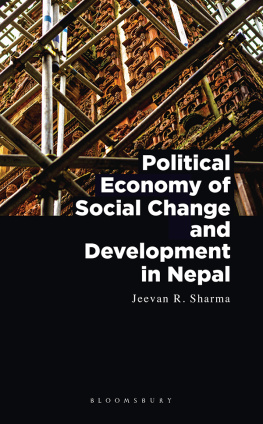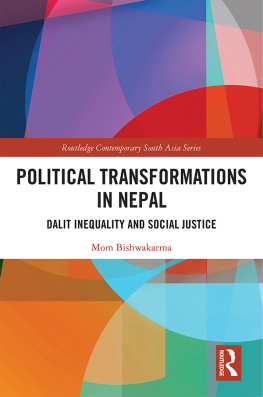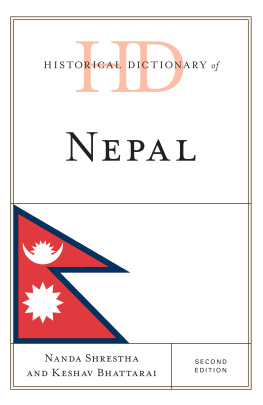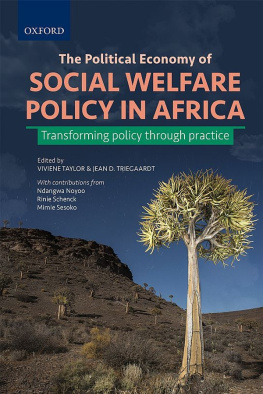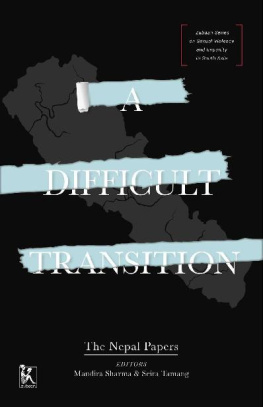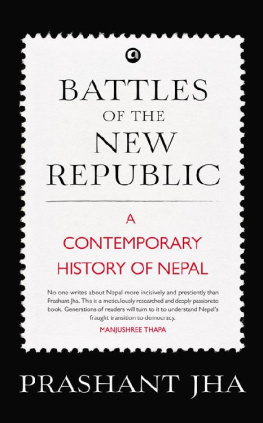
Advance Praise for Political Economy of Social Change and Development in Nepal
Based on over 15 years of research, and drawing on all of the key studies of Nepali society and economy published over a similar period, Jeevan Sharmas book is a deeply insightful analysis of Nepals complex transformation which transcends disciplinary boundaries. He describes a country which is now deeply penetrated by the ideas and material aspects of development, market and modernity, where all of the basic indicators of sustainable development have taken a sharp upward trend, but whose people face the stubborn continuities of socioeconomic inequity and poor governance, obliging many of them to seek financial relief as migrant labourers on terms of unfreedom and precarity. Sharma offers us the most integrative, synoptic and interdisciplinary account of these changes and paradoxes published to date, and his book will, therefore, be an essential reading for anyone interested in modern and contemporary Nepal. Its critical use of Karl Polanyis model of The Great Transformation will also be of great interest to readers concerned with the extent to which theoretical models developed in a EuroAmerican context are helpful for understanding social, political and economic transformations in the contemporary global South.
Michael Hutt,
Emeritus Professor of Nepali and Himalayan Studies,
SOAS, University of London, UK
Jeevan Sharma has produced a stimulating and provocative monograph, as he calls it, on the political economy of social change and development in Nepal. Drawing on original field research and the ideas of Karl Polanyi on The Great Transformation as well as the secondary literature, Jeevan Sharma has produced an analysis that effectively challenges much of the conventional wisdom on, and provides a wholistic overview of, the political economy of development in Nepal over recent decades. It constitutes not only a synthesis of his own original research but also an ambitious attempt to provide an overall integrated theoretical framework for the broader analysis of political, social and economic change in Nepal over the recent decades.
His theoretical framework explicitly draws on Karl Polanyis notion of great transformation, which he sees as involving both the emergence of a market economy and society and a countermovement of social protection in response to the negative effects of the capitalismwhat Sharma refers to as a double movement. But he also refers to more recent theorists, like Goodwin (2018) and Fraser (2013), and argues that what is needed is a framework that recognises the potential of a third countermovement, to fight inequality, hierarchy and dominationa movement of what Fraser calls emancipation.
The framework espoused by Sharma is one that identifies a complex interaction between what might be termed economic, social and political movements or forces, which act in both complementary and contradictory ways to shape the great transformation in any given part of the world. Even more than in the case of the initial great transformation of Western Europe, the analysis of social change and development in Africa, Asia and Latin America in the 20th and 21st century must also integrate the effects of the external forces of capitalism on a global scale.
Sharma seems to believe that, despite the momentous (step change) transformation of Nepals economy, society and politics in recent decades, Nepal has not seen a countermovement from below, leaving the emancipation of the Nepali people yet to be achieved. This seems to effectively consign the 10-year long Maoist insurgency or Peoples War to the rubbish bin of history. For some, however, this will vindicate skepticism regarding the potential in the 21st century of armed struggle to achieve the kind of emancipation to which Fraser refers. Readers may wish, in this regard, to revisit Eric Wolfs great work, also based on a Polanyian perspective, Peasant Wars of the Twentieth Century, first published exactly 50 years ago. He included in his six case studies only those revolutions that were successful.
David Seddon,
Former Professor at the School of Development Studies,
University of East Anglia, UK
The causes and consequences of the mammoth changes that have roiled Nepali polity and society in the recent years have been a story waiting to be told, and that is what Political Economy of Social Change and Development in Nepal has managed to do. Unlike other impressionistic accounts, Jeevan Sharma marshals empirical facts he himself had gathered over the years in support of his argument. The result is this highly readable account of the great transformation, as he calls it, that has yet to come full circle but the outcome of which is there for all to see and understand through the eyes of a scholar grounded firmly in the reality of his home country.
Deepak Thapa,
Director of Social Science Baha, Kathmandu, Nepal
BLOOMSBURY INDIA
Bloomsbury Publishing India Pvt. Ltd
Second Floor, LSC Building No. 4, DDA Complex, Pocket C 6 & 7,
Vasant Kunj New Delhi 110070
BLOOMSBURY, BLOOMSBURY ACADEMIC INDIA and the Diana logo are trademarks of Bloomsbury Publishing Plc
First published in India 2021
This edition published 2021
Copyright Jeevan R. Sharma, 2021
Jeevan R. Sharma has asserted his right under the Indian Copyright Act to be identified as Author of this work
Bloomsbury Academic
An imprint of Bloomsbury Publishing Plc
The views and opinions expressed in this book are the authors own and the facts are as reported by him, and the publisher is not in any way liable for the same.
All rights reserved. No part of this publication may be reproduced or transmitted in any form or by any means, electronic or mechanical, including photocopying, recording, or any information storage or retrieval system, without prior permission in writing from the publishers
Bloomsbury Publishing Plc does not have any control over, or responsibility for, any third-party websites referred to or in this book. All internet addresses given in this book were correct at the time of going to press. The author and publisher regret any inconvenience caused if addresses have changed or sites have ceased to exist, but can accept no responsibility for any such changes
ISBN: HB: 978-93-89449-22-8; eBook: 978-93-89449-24-2
Creatrd by Manipal Technologies Limited
Printed and bound in India
Bloomsbury Publishing Plc makes every effort to ensure that the papers used in the manufacture of our books are natural, recyclable products made from wood grown in well-managed forests. Our manufacturing processes conform to the environmental regulations of the country of origin.
To find out more about our authors and books visit www.bloomsbury.com and sign up for our newsletters
This book is a synthesis of my research conducted over the last several years, in collaboration with colleagues, research partners and research participants in Nepal. Over the years, I have benefited from the inspiration, encouragement and generous support from many people in different places.

